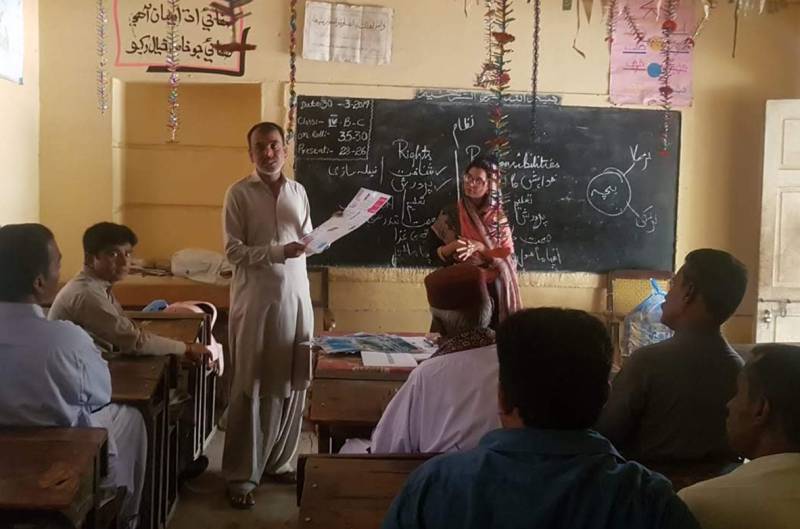
“Children learn more from what you are than what you teach”—W.E.B. Du Bois
If at all children’s second crush is determined after that of their mother, most of the time it would turn out to be their kindergarten teacher. This is also their first exposure to the real world of strangers therefore there cannot be two opinions about the importance of teachers in this initial stage of their lives. Tearing away from the comfort of their mother’s arms is no easy deal, what to talk of having to tackle another entity that might or might not be affectionate. According to child psychologists, early years’ experiences can have permanent physical, social and emotional impacts on children. These can either convert them into strong human beings or have negative effects that may last a lifetime. Only a good foundation can guarantee the making of well-functioning adults.
Up to the age of three, the brain develops rapidly whereby billions of connections get established between individual neurons. At this critical juncture and for their positive development, it is important that children are provided a supportive environment surrounded by adults having a good understanding about managing relationships. As per Dr. Jack Shonkoff, a leading scholar on early child health and development and director of the Harvard Center on the Developing Child, when subjected to conducive environment children are likely to reach milestones critical to future individual and community success. These include: “Third-grade reading proficiency; high school graduation and postsecondary education; gainful employment; lifetime physical and mental health and well-being; and avoidance of substance use disorder and crime."
Teachers should understand that every word they utter, every gesture they make and every expression of their face is being closely scrutinized by their class. Each student has their peculiar style of observation, but definitely each child is making their own deductions. The job of tutors can be akin to stepping on eggshells that requires extreme dexterity and sensitivity, but are we really prepared to venture on such a career? Being a good academician is no qualification for being a good educator.
Conscientious tutors’ duties are not restricted to mere textbook coaching but stretch out to the domains of intellectual, moral and social training of their students. Similarly, their characters also must exude those attributes that help to create better people for they are the ones who would be taking on the responsibilities of future societies.
Among other things teachers need to learn is the way they conduct themselves. They should abstain from objectionable behavior like use of foul language, throwing books around, singling out specific children and being unreasonably partial towards others. Those who indulge in these shenanigans have no clue about their detrimental effects on young minds. One such primary school student, who was victim of an elderly teacher’s bias complained to his mother about her attitude. She not only treated the child with contempt (for no apparent reason), but did not even acknowledge his kind acts. Once when he tried to help her out with the heavy burden of books she was carrying, instead of thanking him, she just ignored and walked away leaving the boy with a broken heart. In short, her entire demeanor was enough to lower the child’s self-esteem and shatter his self-confidence. This is the story of one child from that particular class of thirty. One wonders how many others also suffered the same ordeal.
At a formidable age, undergoing such experiences can really prove devastating for a child’s personality. To lose one’s self-respect or to develop the complex of ‘not being good enough’ or the feeling of inadequacy, are some of the negative traits that can eventually distort young children’s character, making them unfit to function as decent adults and can also badly influence their future relationships. Even higher school, college and university students can face similar trauma although they may be in a better position to ward off the ill-effects and just overlook such behavior. Still, a great deal more effort is required on the part of teachers to check their conduct and consciously engage in better tactics to handle those whom they dislike, for whatever reason. Playing with the future of one’s students cannot be appreciable for people who intend to pursue teaching as their career.
Before embarking on this great profession much self-study is required to chalk out one’s line of action. Simultaneously, those who recruit prospective teachers must evaluate them properly to ensure that parents should not be complaining about their behavioral aspects. It has been observed that some teachers make it an ego issue, victimizing the child even more rather than sorting out their own attitude. Like the pre-medical entry tests for future doctors, there should be such tests, including psychological ones for hiring public school teachers. Even private educational institutions should be more cautious when employing the services of applicants.
In the words of APJ Abdul Kalam: “Teaching is a very noble profession that shapes the character, caliber, and future of an individual. If the people remember me as a good teacher, that will be the biggest honor for me”.

